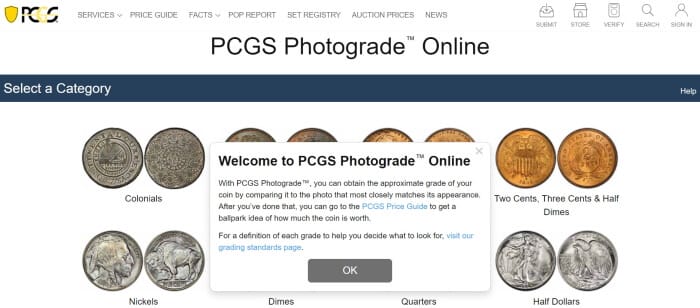Coin collecting, also called numismatics, is one of the oldest hobbies in the world. Many people begin their coin collecting journey by finding an interesting coin or by inheriting a coin collection.
Although some people collect old coins only for fun, most who invest in coins do so for potential long-term profit. If you’re going to be collecting something as a hobby, you might as well collect something that may appreciate in value over the years.
Collecting coins can be a rewarding hobby. In this article, we’ll share some tips to ensure you’re off to a good start and will have a memorable coin collecting journey.

Coin Collecting Tips for Beginners
Start Small
If you’re new to the world of coin collecting, it’s often tempting to go and buy a whole lot of coins without a second thought. However, as you become more savvy, you’ll often regret buying those coins.
Before you spend money on a coin, first do some research to make sure you’re getting value for your money.
Learning more about a coin’s history and value is part of the fun of being a coin collector.
When you do eventually acquire that coin it will be much more fulfilling than if you buy it without really knowing what you’re buying.
Delayed gratification tastes a lot sweeter than impulse purchases. Resist the temptation of trying to build a huge coin collection overnight.
What Coins to Collect?

When it comes to coin collecting, the sky’s the limit! There’s no right or wrong answer to what coins you should be collecting. Collect what you like.
Some collectors collect coins depicting animals such as birds from all over the world. Others collect old gold and silver coins. And there are many collectors that only collect uncirculated coins.
If coin collecting is only a hobby for you and you have no real interest in the monetary value of the coins you’re collecting, you can collect any type of coin. However, if you collect coins with the intention of one day selling them, perhaps to buy higher-grade coins, you need to be more selective.
For example, coins minted in other countries are often not that popular with U.S. collectors. You may not be able to sell them for what they’re worth in the United States.
Look After Your Coins Properly
Coins may be made of metal, including precious metals, but the surface of a coin can easily be damaged. Practicing safe handling and storage techniques are essential.
Handling Coins
When handling a coin, you should never touch the face of the coin. Oil and dirt from your fingers can damage it. Always wear cotton gloves when handling it. And if you don’t have cotton gloves, only handle the coin by its edge.
In addition, don’t talk over your coin. If tiny parts of saliva land on it, it might cause blemishes.
Don’t Clean Your Coins
Attempting to clean coins, even with just soap and water, can cause more harm than good. The only exception to this rule is freshly dug up coins from the ground that you found using a metal detector. But even then, just spray them clean with water and don’t rub them.
Storage
Don’t store coins together in a container where they can touch and scratch each other. Each coin should have its coin container, but avoid PVC containers as its composition might damage the surface of the coin over time.
Continue Learning And Keep Up To Date
There are many online resources that can help you to learn more about coin collecting and keep you up to date with new developments. Two worth mentioning are Coin World and Numismatic News. But be careful of advertisers that want to sell you overpriced coins!
It’s a good idea to familiarize yourself with the lingo or terminology used in numismatics.
One of the best ways to learn more about coin collecting and what pitfalls to avoid is to meet up with other collectors. Many cities have coin clubs. It’s a great way to meet like-minded people.

1794 Flowing Hair Dollar – Sold for just over $10 million at auction in 2013, making it the most expensive coin ever sold in the United States. It’s believed to be the first silver dollar coin struck by the U.S. mint.
Watch Out For Scams
One of the biggest risks of coin collecting is falling for scams. There are many forgeries on the market and some dealers might lie about a coin’s grade or value. Do your research, both on the coin you’re shopping for and the dealer you would like to buy it from.
When possible, shop for a coin that has been certified by an independent grading service such as the Numismatic Guaranty Corporation (NGC) or Professional Coin Grading Services (PCGS). Both examine and grade coins before sealing them in tamper-proof cases.
Most coins, including those graded by PCGS, are graded in accordance with the Sheldon Scale that was developed by Dr. William Sheldon in 1948. The Sheldon Scale assigns grades from 1 through to 70 to coins.

PCGS Photograde™ is an online service you can use to obtain the approximate grade of your coin by comparing it to a photo that most closely matches its appearance. PCGS also has a price guide that can give you a ballpark figure of how much your coin is worth.
Where To Buy Coins
There are many websites and coin dealers that sell coins. The main disadvantage of buying a coin on a website is that you don’t have the opportunity to physically view and inspect the coin. Buying a coin based on what it looks like in a photo is not ideal.
One of the “secret” sources for many coin collectors is pawn shops.
Pawn shops have many advantages over online marketplaces and coin dealers. It’s easier to negotiate with a pawn shop than a coin dealer. And you’re more likely to find a special deal at a pawn shop than at a professional coin dealer that only deals in coins.
That’s a Wrap
Coin collecting can be both a fun and lucrative hobby. The tips shared in this article should ensure that you’re off to a good start on your coin collecting journey.
If you have any questions about coins you want to buy, sell, pawn, or have evaluated – don’t hesitate to contact Maxferd.
Call us at (800) 888-7296 or visit one of our five locations in San Francisco and Los Angeles to find out how we can assist you.

